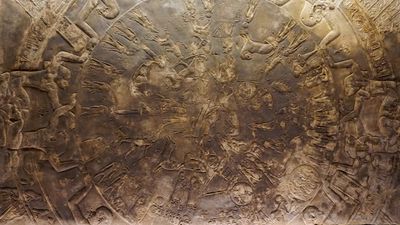Egypt Wants the British Museum to Return the Rosetta Stone
Egyptian archaeologists are calling on Britain to return the historic stone.
Egyptian archaeologists are calling for the Rosetta Stone to be returned to Egypt from the British Museum.
The campagin is being lead by Dr. Monica Hanna, an Egyptologist and the Dean at the Arab Academy for Science, Technology and Maritime Transport. She spoke with CBS News and shared that, although there had been previous requests for the artifact to be returned, she was confident that the current approach would produce more results.
"Previously it was the government alone asking for Egyptian artifacts, but today this is the people demanding their own culture back," Hanna said. "Definitely all these objects are going to be repatriated, it is just a matter of when."
So far, the archaeologists have gathered over 2,500 signatures through an online campaign. According to the petitioners, the Rosetta Stone is not the only artifact that was taken by the British. They argue that 16 other artifacts that were looted from Egypt have been in the United Kingdom for centuries.In the top portion of the petition, the verbiage indicates that returning the Rosetta Stone an opportunity for Britain to demonstrate its moral acumen and do the right thing.
"This is a powerful opportunity for Britain to demonstrate moral leadership, and to choose to follow moral principle over profit and support the healing of the wounds inflicted by colonial powers. We urge everyone who believes in the right of cultural identity, the right of equality among nations, and the inalienable right of each sovereign state to enjoy their own heritage and reclaiming that heritage if it has been taken from them; to sign this petition in support of the return of Rosetta stone to its country of origin: Egypt."
The Rosetta Stone is a granitoid stone that features a written decree issued in 196 B.C. by Egyptian clergymen and Ptolemy V., who was Egypt’s leader at the time. The decree was presented in three forms: hieroglyphics, which were used mainly by priests; Demotic, a less complex script, and ancient Greek.
During the 4th century, the use of hieroglyphics became more complicated, and researchers saw the stone as an essential tool to help them understand the long-forgotten language of Egyptian hieroglyphics before Europeans took it.
Earlier this year, South Africa also requested that Britain return "The Great Star of Africa," a significant historical artifact and the world's largest clear-cut diamond.
In a powerful sentence leading to the closing of the petition statement, the organizers acknowledged that other countries were affected, writing that this petition for Egypt to lead other Arab and African countries to push for repatriation.
"This is a substantial opportunity for Egypt to lead the Arab and African regions to recover the looted heritage under colonialism. The return of the Rosetta stone would be an example of putting an end to western hegemony over Egyptian heritage," the statement read. "It would also have an important impact, not only on the restoration of emaciated Egyptian cultural rights, but also on economic rights in a significant way. The repatriation of the Rosetta stone to its original location in the city of Rashid will also change the tourist map and attention to this ancient historical city."
- Egypt to Sue London Auction House for Selling King Tut Statue ... ›
- Egypt Lights Up the Great Pyramid of Giza With 'Stay Home, Stay ... ›
- AFCON: Egypt Loses To Nigeria For The First Time in 17 Years ... ›
